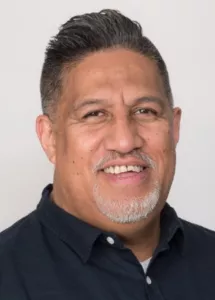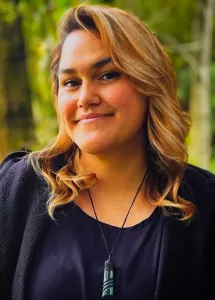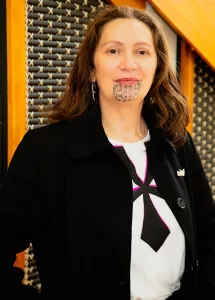
Kahu McClintock is an example of Māori leadership that provides direction and also a source of strength and inspiration. With almost 45 years of experience working with Māori whānau, communities, and iwi, Kahu shows what can be achieved through a commitment to helping others, hard work, and courage.
Kahu’s approach to leadership is the result of multiple strands of knowledge woven together; cultural, clinical, and academic. One of her strongest influences is her whānau (family). She was born the sixth of eight children raised in the small provincial town of Piopio in the King Country, by a strong Ngāti Porou mother and humble Waikato-Maniapoto, Ngāti Mutunga father. Kahu was nurtured in a working class Māori whānau that valued education and connections to each other.
At 17, Kahu entered a career in mental health as a trainee mental health nurse at Porirua Psychiatric Hospital in Wellington. Guided by a passion for Māori culture and supporting Māori communities, Kahu would go on to become qualified as a mental health nurse, a primary school teacher, and advisor in special education, and working in kaupapa Māori Child and Adolescent Mental Health Services (CAMHS). While working full time in CAMHS and raising two children by herself, Kahu completed a Masters of Philosophy in Māori studies. After her Masters, she began her career in health research. While working as a researcher, Kahu went on to complete a Doctorate and Post Doctorate in Psychiatry, with a special focus on culturally appropriate CAMHS for Māori. All of these experiences and skills serve Kahu well in her current work in Māori health research.
From 2006 to 2021, Kahu led the establishment and development of the National Kaupapa Māori Research Unit at Te Rau Ora for nearly a decade, while also serving as the Editor of the Journal of Indigenous Wellbeing: Te Mauri - Pimatisiwin, successfully transitioning the journal from Canada to Aotearoa.
Between 2006 and 2015, Kahu represented her marae, Mangatoatoa, on Te Whakakitenga o Waikato (Waikato-Tainui tribal council). From 2015 to 2021, she was elected as the Waikato-Tainui representative on the Waikato District Health Board Iwi Māori Council and the Waikato District Health Board Monitoring Performance Committee. During this time, she was also a Ministerial appointee to the National Ethics Advisory Committee.
In 2021, Dr. McClintock shifted her focus to supporting her iwi in research initiatives. One such project, Kia Kite ai te Ora: COVID-19 Impact on Ngāti Maniapoto Iwi, captures the voices of iwi survivors of COVID-19. This groundbreaking research, the first of its kind, will be publicly released in 2025.
Throughout her career, Kahu has carried out leadership roles across multiple levels, always emphasizing that leadership is a responsibility to improve the lives of the whānau she serves.
Links:
Ngā Pae o te Māramatanga - Dr Kahu McClintock
Heath Reserach Council: Indigenous solutions: enabling Maori & Pacific mental health resilience
Rachel McClintock
Updated 9 December 2024



